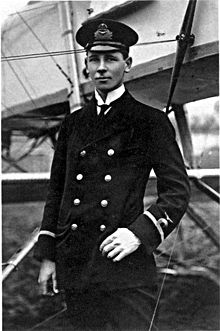Reginald Warneford
| Reginald Alexander John Warneford | |
|---|---|

R.A.J. Warneford, V.C. standing in front of a Maurice Farman Shorthorn
|
|
| Born |
15 October 1891 Darjeeling, British India |
| Died | 17 June 1915 (aged 23) Buc, Yvelines, France |
| Buried at | Brompton Cemetery, London |
| Allegiance |
|
| Service/branch |
|
| Years of service | 1914 - 1915 |
| Rank | Sub-Lieutenant |
| Unit | No. 1 Squadron RNAS |
| Battles/wars | World War I |
| Awards |
Victoria Cross Légion d'honneur (France) |
Reginald Alexander John Warneford, VC (15 October 1891 – 17 June 1915) was a Royal Naval Air Service (RNAS) officer who received the Victoria Cross, the highest and most prestigious award for gallantry in the face of the enemy that can be awarded to British and Commonwealth forces.
Warneford was born in Darjeeling, India, the son of an engineer on the Indian Railways. He was brought to England as a small boy and educated at King Edward VI School, Stratford-upon-Avon but when his family returned to India he continued his education at the English College, Simla. Following apprenticeship in the Merchant Marine, Warneford joined the British-India Steam Navigation Company. At the time of the outbreak of World War I, he was in Canada awaiting return to India. Instead, he sailed then to Great Britain, joining the Army but almost straightaway transferred to the Royal Navy Air Service for pilot training.
Warneford's initial training took place at Hendon, passing then to Upavon where he completed his pilot training on 25 February 1915. During the course of training, the Commander of Naval Air Stations, R M Groves was quoted as saying: "This youngster will either do big things or kill himself." Warneford's flying instructor at the time, Warren Merriam, noted his skills as a pilot but had to make special arrangements to ensure that Warneford's perceived over-confidence did not bar him from attaining a commission. Merriam took an opportunity whilst Commander Groves was visiting Hendon to ask Warneford to demonstrate his flying skills. Groves' favourable impression overcame the views of the Squadron Commander at the time who believed that Warneford would never make an officer because of his lack of discipline.
...
Wikipedia
